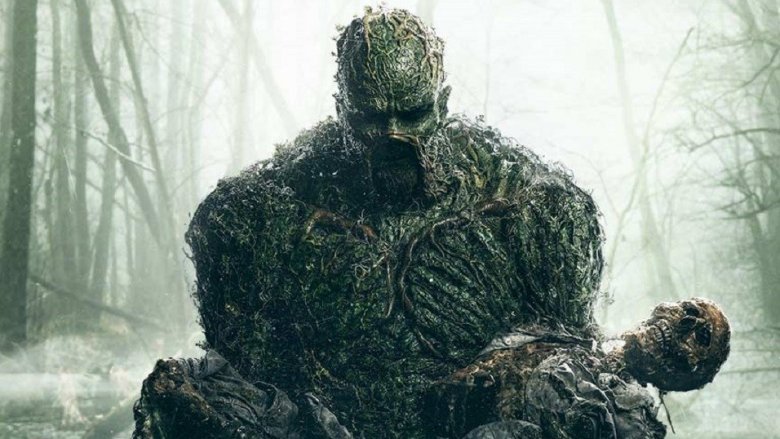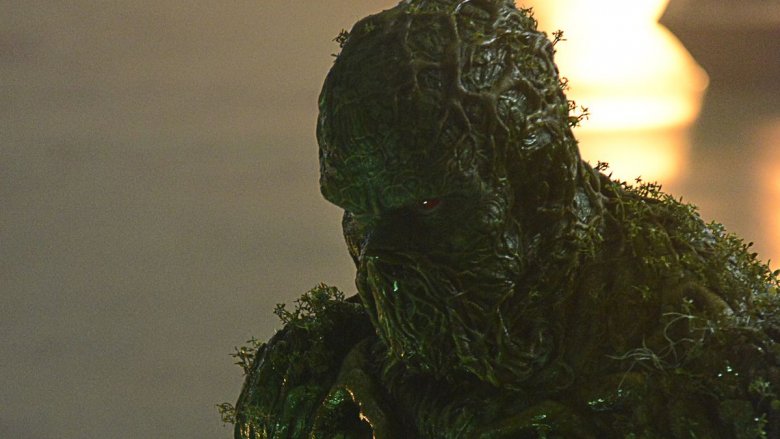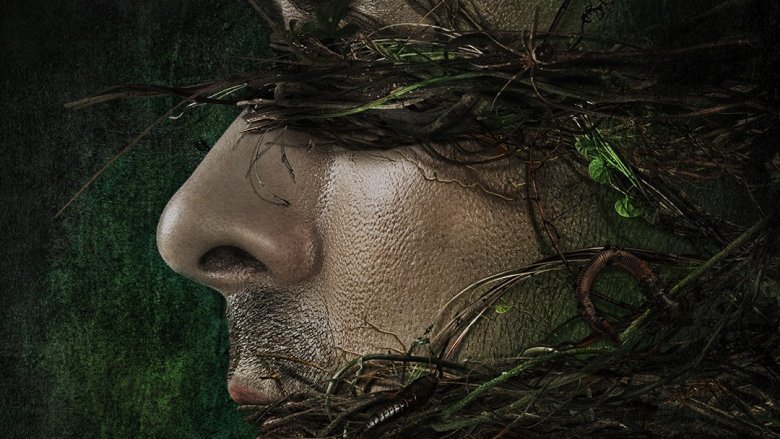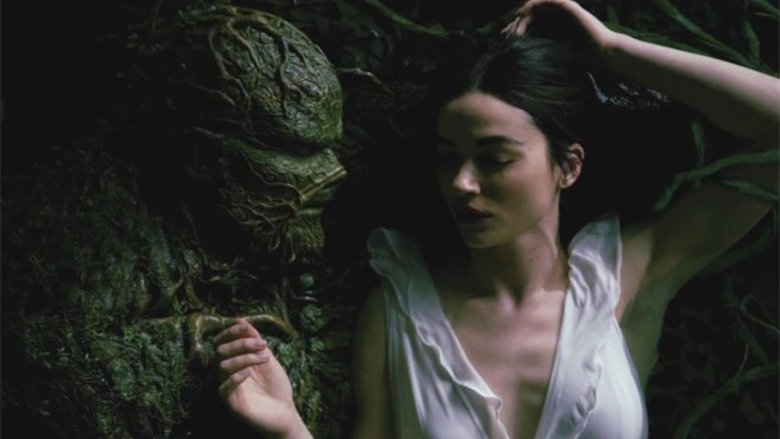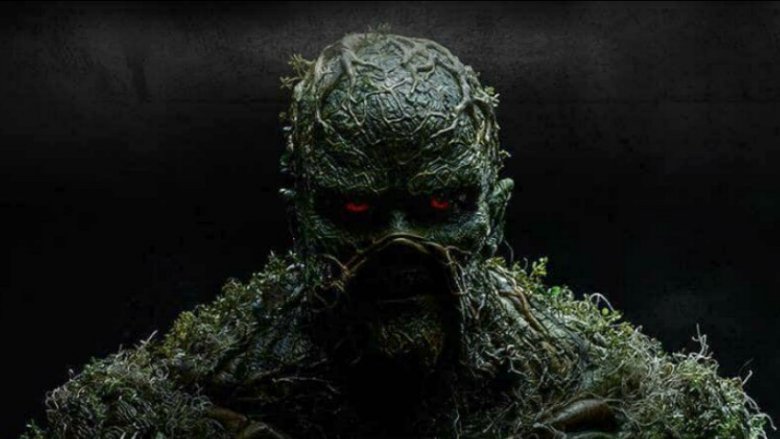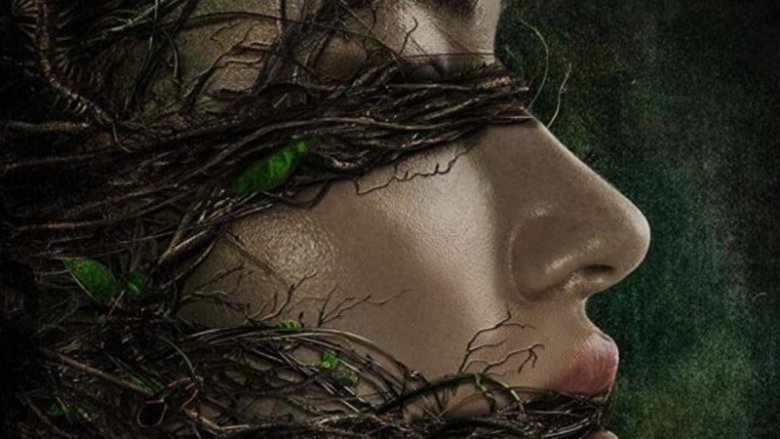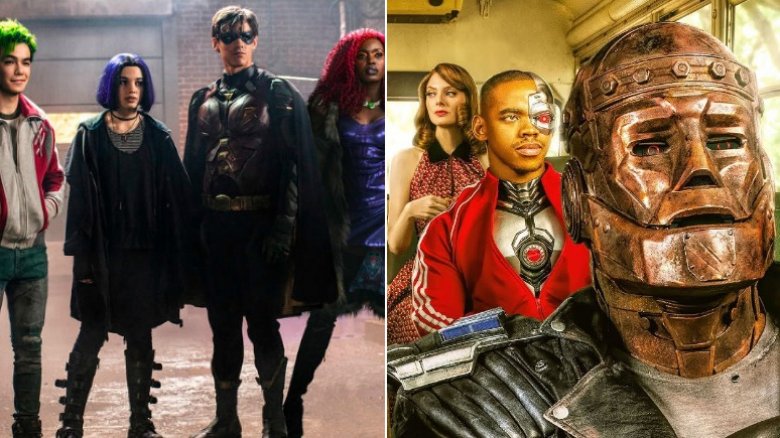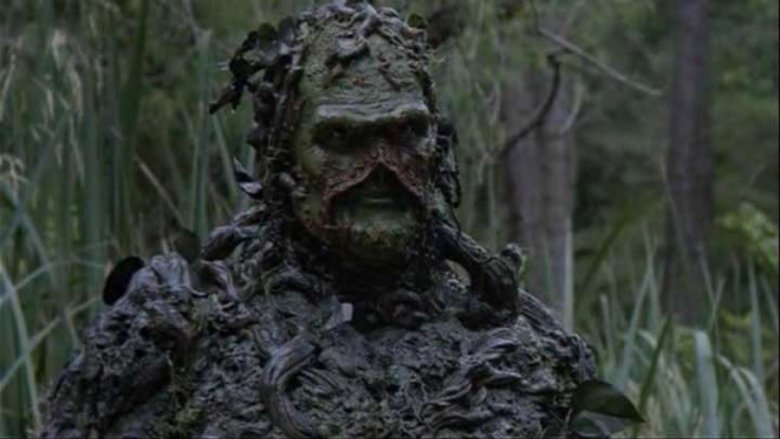The Real Reason DC Canceled Swamp Thing
In early June 2019, fans were shocked to learn DC Universe's new live-action original show Swamp Thing – a horror series set in the swamps of Louisiana – had been canceled. Not only had the series earned mostly favorable reviews at the time its cancellation was announced, the second episode of the series had yet to air on DC's streaming service, leaving fans to wonder what possibly could've already gone wrong enough to justify cutting the show loose.
Swamp Thing is based on the DC Comics title of the same name. While it wasn't created by the pair, one of the series' most well-remembered eras was during the tenure of writer Alan Moore (who had not yet written Watchmen) and artist Stephen Bissette. So while general audiences may not have known much about Alec Holland's transformation into a bizarre swamp creature, any Alan Moore fans among DC Universe's subscribers were likely anticipating Swamp Thing more than any of the other announced original series.
So why was it canceled? There's no clear word on the official reason for the cancellation just yet, and there have been plenty of conflicting reports — at least one of which has been debunked. After looking at the various rumors and speculation, we've dug up some truth about the real reasons DC quickly canceled Swamp Thing.
Early shutdown
The first sign that the series was in trouble came even before the first episode aired on DC Universe. In mid-April it was reported production on Swamp Thing was being shut down early and that the show's first season, originally planned for 13 episodes, was being whittled down to 10 with the tenth episode being rewritten to provide a satisfying conclusion.
There was no word on exactly why Swamp Thing's first season was abbreviated, but the news certainly didn't boost fan confidence. Neither did a now-deleted Instagram post from one of the series' cast members. Virginia Madsen, who played the troubled Maria Sunderland in Swamp Thing, wrote on her Instagram page "I'm beyond sad. What a terrible decision. We have been cut to the core by those who have never set foot into the Swamp. And despite the rule I am going to use the hashtag. #swampthing."
The Playlist initially speculated that the Swamp Thing season truncation was a sign that DC Universe itself was under threat, but later updated their story to say sources had told them the reason for the shortened season was "creative differences."
The debunked state funding story
One of the earliest and most widespread speculations was made by Movies.com writer John Gholson (via CBR) in a series of now-deleted tweets. The story, which has been debunked, is that Swamp Thing was cut short because the series went over budget and that this excess came mostly because of an accounting error blamed on the state of North Carolina, where the series was filming. The story went that Swamp Thing's budget was $80 million and that North Carolina had — through a program to encourage filmmaking in the state — promised to cover $40 million of the production costs through state grants. Then, as the early story goes, someone in the state of North Carolina government messed up and Swamp Thing's production was only granted $12 million of the promised $40 million. So, short $28 million, the Swamp Thing production closed up shop.
Shortly after that story began to circulate, ScreenRant reported that the accounting error theory simply wasn't true. Swamp Thing was granted $12 million for its first season's production, which is the legal limit for the grant program that Swamp Thing's production team applied to. They were also allowed a separate grant of $4.9 million for the pilot episode because the production team had reported that episode by itself would cost $20 million. There was never a discussion of North Carolina picking up half the bill for Swamp Thing.
DC Universe may not have long to live
According to some, the cancellation of Swamp Thing doesn't just impact that series, but could threaten every other original DC Universe show. Swamp Thing may have been truncated and then canceled, some speculate, because the DC Universe streaming service itself doesn't have long to live, so why pay more money for three more episodes?
In June 2018, AT&T completed its acquisition of Time Warner, of which the DC Universe streaming service is a part. When it reported Swamp Thing's cancellation, Deadline pointed out that "DC Universe is being reevaluated following the completion of AT&T acquisition." In particular, Deadline pointed to WarnerMedia's upcoming streaming service and wrote that "There have been questions how DC Universe fits into those plans."
The implication seems to be that if WarnerMedia is going to have its own streaming service, a separate DC Universe streaming platform might be considered redundant. If that's the case, then producing new original series in the interim could be considered a waste.
DC has an itchy trigger finger
Commenting on the cancellation of Swamp Thing on the horror website BloodyDisgusting, writer Brad Miska speculated that upon its cancellation Swamp Thing had become "the first of probably many scapegoats."
The problem, Miska wrote, is that DC Universe was experiencing problems and something had to give. The result was, according to Miska, Time Warner refusing to give the still-young streaming service "time to breathe." Comparing it to AMC's handling of the horror streaming service Shudder, he criticized DC Universe for giving up too soon and "setting themselves up for failure."
Miska certainly could be right. Perhaps suffering in Marvel's shadow on the big screen has made Time Warner executives more skittish in the face of any sign of less than complete and undeniable success. But there weren't a lot of specifics mentioned in Miska's story and it was later updated to include a report that creative differences were being cited by some as the reason for Swamp Thing's early demise.
Creative differences
With some time having passed since Swamp Thing's cancellation and the chance to sift through the various stories presents itself, it seems like creative differences may very well be the culprit in the series' premature ending.
Many of the sites who originally speculated other reasons for Swamp Thing's cancellation have since updated to confirm that unnamed sources have given them the somewhat ambiguous explanation of "creative differences." The Playlist updated their report to say "sources close to [DC Universe]" told them that the decision to cut short Swamp Thing's season 1 was a creative decision, and that DC Universe's performance "was outpacing expectations." /Film likewise reported the season truncation was due to "creative reasons" and Deadline – without going into specifics — originally noted that after AT&T's acquisition of Time Warner the "new leadership was not particularly high on Swamp Thing."
One of the few sites to offer any specifics in their update was BloodyDisgusting, who claim their source told them the creative differences in question were about the nature of the series. According to the site, some people behind the scenes wanted Swamp Thing to be a horror series, while others wanted a "weekly procedural." We're not sure how anyone pictures a swamp monster brushing for fingerprints, but okay.
Disconnected
DC Universe's first live-action original series, Titans, let its viewers know relatively early that it was a part of a larger narrative by introducing most of the cast of the then upcoming Doom Patrol in its fourth episode. Swamp Thing is the first of the streaming service's live-action original series to not be connected to the others, and therein may lie part of the problem.
Marvel Studios has learned that being a part of a larger narrative can lead to individual and overall success. The MCU's films support one another just as its Netflix series supported one another. And while the Defenders didn't show up at the end of Avengers: Endgame and Captain America never guest starred on Jessica Jones or Daredevil, you know as you watch that they're all part of the same world.
If DC Universe is striving for that same interconnectivity in its original series — which the connection between Titans and Doom Patrol seems to confirm — then that may make it one more reason that Swamp Thing doesn't fit into its future plans.
Long memories
Many comic book fans were first exposed to the story of Alec Holland and his transformation into a swamp creature through Alan Moore's game-changing comic book. If you weren't aware of Moore's work but had still had heard of Swamp Thing, then there's a good chance you saw the 1982 Swamp Thing movie — which would likely leave you confused as to why anyone would make a series based on that.
While Swamp Thing and its sequel Return of the Swamp Thing can be appreciated today on a camp level, upon its release it seemed largely ridiculous. As J.C. Maçek III wrote for PopMatters, while watching Swamp Thing it proves "difficult to ignore that Swamp Thing ultimately is, at core, a rubber-suit monster movie."
You only need to watch the first of DC Universe's Swamp Thing episodes to know that the description of a "rubber-suit monster" show can't be applied to the series, but those with long memories of the Swamp Thing films of the '80s might not have been willing to give it the chance to prove itself.
